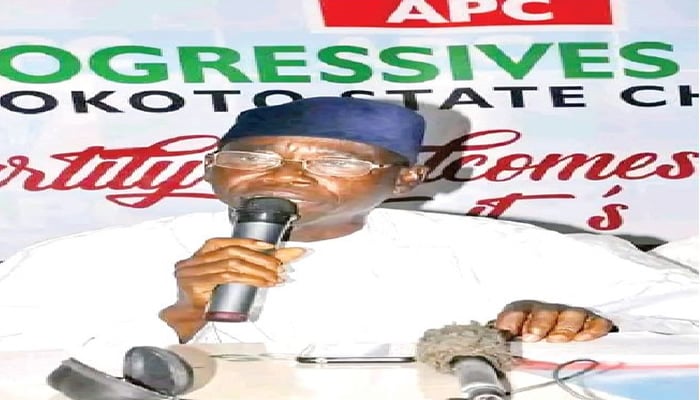The political landscape in Sokoto State, Nigeria, is heating up as Alhaji Sadiq Achida, the Chairman of the All Progressives Congress (APC), launched a blistering attack on former Governor Aminu Tambuwal, a prominent figure in the Peoples Democratic Party (PDP). Achida’s accusations paint a picture of Tambuwal as a politically spent force, devoid of an independent power base and reliant on the influence of political patrons, particularly Senator Aliyu Wamakko, for his past ascendance. This strong denunciation comes amidst Tambuwal’s involvement in a coalition with the African Democratic Congress (ADC) aimed at challenging the current administration of President Bola Tinubu and Sokoto State Governor Ahmed Aliyu.
Achida’s critique centers on Tambuwal’s eight-year tenure as governor, which he characterizes as a period of stagnation marked by abandoned projects and alleged asset stripping. The APC chairman further contends that Tambuwal deliberately avoided a formal handover to his successor, Governor Aliyu, in an attempt to evade accountability for the state’s dire condition upon his departure. This alleged maneuver, according to Achida, was a calculated strategy to obstruct the current administration’s progress. He contrasts this with what he portrays as Governor Aliyu’s prudent financial management, highlighting the timely payment of salaries, implementation of the new minimum wage, and ongoing infrastructure projects, all achieved without resorting to borrowing.
The core of Achida’s argument rests on his assertion that Tambuwal lacks a genuine political foundation, having risen to power through the patronage of influential figures rather than through grassroots support. He dismisses any potential resurgence of Tambuwal’s political career, claiming that neither alliances forged in Abuja, media campaigns, nor political coalitions can rehabilitate a politician whose legacy, according to Achida, is defined by propaganda and a state left in disarray. This assessment reflects a deep-seated rivalry between the two political figures and their respective parties, with Achida seeking to discredit Tambuwal’s political standing and influence within the state.
While Achida paints a bleak picture of Tambuwal’s political future, the former governor’s involvement in the ADC coalition suggests a continued ambition to play a significant role in the state’s political landscape. His alliance with the ADC signals a strategy to challenge the ruling APC and potentially regain political relevance. This coalition represents a potential threat to the APC’s hold on power in Sokoto State, and Achida’s strong words can be interpreted as an attempt to preemptively undermine Tambuwal’s credibility and influence within this new political arrangement.
In contrast to the accusations leveled against Tambuwal, Achida praises Governor Aliyu’s performance, portraying him as a fiscally responsible leader focused on the welfare of the people. By emphasizing Aliyu’s achievements and contrasting them with Tambuwal’s alleged failures, Achida seeks to bolster the current administration’s image and solidify public support for the APC. This strategy aims to present a clear distinction between the two administrations, highlighting the APC’s purported commitment to good governance and the well-being of the citizens of Sokoto State.
The public exchange of accusations between Achida and Tambuwal’s camp highlights the intensifying political rivalry in Sokoto State. A close aide to Tambuwal, speaking on condition of anonymity, has dismissed the allegations as baseless, promising a detailed response after consulting with the former governor. This sets the stage for a potentially protracted political battle, with both sides vying for public support and seeking to influence the narrative surrounding their respective legacies and political futures. The upcoming responses from Tambuwal’s camp are expected to further illuminate the key issues and disagreements driving the political dynamics in Sokoto State.














